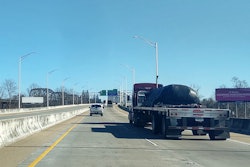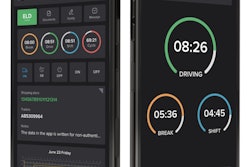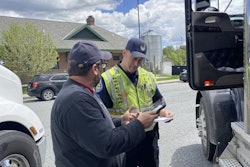Trucking news and briefs for Friday, Sept. 5, 2025:
- What could help solve the English language proficiency issue in trucking? An ELP endorsement on CDLs, some drivers propose.
- Thinking of jumping from company driver to owner-op? OOIDA’s upcoming Truck to Success program could help.
- Melton Truck Lines driver John Patterson's quick action to help pull injured crash victims from trapped positions in their wrecked vehicles.
Truckers petition FMCSA to make ELP a required CDL endorsement
A bilingual truck driver and three collaborators have filed a petition for rulemaking with the Federal Motor Carrier Safety Administration proposing a new English language proficiency (ELP) commercial driver’s license endorsement. Petitions for rulemaking are reviewed by FMCSA and either granted for further action or denied.
Natasha E. Cruz-Sanchez filed the petition with the purpose of establishing “a transparent and constructive dialogue between truck drivers for whom English is a second language and the DOT.” Cruz-Sanchez collaborated on the petition with CDL A holders Nelson Gonzalez-Rivera, Edgar Rolon-Padilla, and Pedro Cancel.
The petitioners call their effort “The Safe Communication Act: English Language Proficiency Endorsement for Truckers.” They note that regulatory language around CDL qualifications “is both confusing and inconsistent -- particularly in its distinction between ‘requirements’ and ‘qualifications,’” they said. The petitioners added that the differences between those terms create a lack of uniformity, which “fosters a subjective and sometimes biased enforcement environment.”
[Related: Why state police are letting drivers placed OOS for English violations go free]

Their solution: Establish ELP as a formal endorsement, much like Hazmat, Passenger, Tanker, and others.
“This would make ELP a clearly testable, verifiable, and standardized credential, consistent across all jurisdictions,” the petition said. “Such a reform would enhance legal clarity, uphold safety standards, and promote fair and equal treatment for all commercial drivers.”
The group petitioned that FMCSA promulgate a rule that creates the ELP endorsement based on the Federal Aviation Administration’s (FAA) post-2008 model, which they said offers “clear criteria, three scoring categories, fair appeals.” The endorsement would be available via in-person DMV testing.
According to the petitioners, FAA requires that “all airman certificates issued since February 11, 2008, include an English proficiency endorsement.”
[Related: New legislation takes aim at ELP enforcement, CDL issuance]
They also propose a one-year grace period for current CDL holders. If the rule were to come to fruition, thus, truck drivers who currently hold a CDL would have a year to go to their DMV and apply for the endorsement. CDL applicants would also be required to obtain the endorsement before obtaining their commercial learner’s permit (CLP).
After the one-year grace period, the petitioners propose that “any CDL holder who has not obtained the required endorsement may be issued an ultimatum to downgrade their CDL to a non-commercial license, and any driver operating a commercial motor vehicle without the required endorsement is subject to being placed out of service if stopped for inspection or enforcement.”
The petitioners noted that, “while we support the enforcement of ELP standards, we urge DOT and lawmakers to recognize that language alone is not the root cause of safety risks,” they concluded. “Rather, these challenges stem from broader systemic issues, including inconsistent training standards, lack of regulatory oversight across fleet sizes, and insufficient continuing education requirements. We strongly believe that professionalizing the trucking industry must start before individuals even enter trucking schools. Implementing ELP Endorsements for both prospective and current drivers will significantly improve our industry. We must address the root causes of safety issues rather than continue to apply superficial fixes. Professionalizing this industry is not only about compliance -- it’s about protecting lives and elevating the standards of an essential workforce.”
[Related: Rise of the non-domiciled CDL for non-citizen truck drivers: Safety, rates, security]
OOIDA opens registration for annual Truck for Success seminar
The Owner-Operator Independent Drivers Association will host its annual Truck to Success course for truck drivers looking to become leased or independent owner-operators next month.
The organization said it’s noticed that many small trucking businesses tend to fail within the first year of operating for a variety of reasons. The OOIDA Foundation, the educational and research affiliate of OOIDA, wants to help navigate those going through the change from a company driver to an owner-operator, or simply help with the desire to have a more successful trucking business.
That’s where the Truck to Success course comes into play, with the option to participate in person or online. The annual, in-person option is a three-day course designed for drivers looking to become a leased-on owner-operator or an owner-operator under their own authority.
Truck to Success will take place Oct. 21-23 at the Courtyard by Marriott in Blue Springs, Missouri, as well as online via Zoom. The deadline to register for the in-person portion is Oct. 1, while the deadline to register for the online course is up to the day before the event begins, Oct. 20. Registration is available online here.
[Related: What it takes to be your own boss: The truck owner-operator's playbook for success]
The in-person seminar cost is $600 per person, which includes breakfast, lunch, and snacks. Lodging is not included. However, participants can book a room at the Courtyard by Marriott and receive OOIDA’s corporate rate. Each individual is allowed to bring one guest for $150. The online seminar cost is $275 per login connection. Attendees may bring a guest for an additional $150 if that guest requires a separate login, meaning they will login to the seminar from another location differing from your own. This is due to limited capacity.
The training is designed to follow a logical path along the transition from a company driver to an independent contractor to an owner-operator with their own authority.
The seminar covers some of the most important points owners need to deal with in order to avoid failing as an owner-operator, including the importance of a business plan, choosing the right equipment and financing, deciding whether to lease or get your own authority and much more.
Registration for both classes is open to anyone, you do not have to be a member of OOIDA to participate in the classes.
[Related: $2.30. $3, $10/mile: Why haul would you choose? Profit analysis might surprise you]
The Overdrive/ATBS coproduction of the Partners in Business playbook offers a wealth of advice about the start-to-finish journey of an owner-operator career. PIB is a comprehensive trucking guide, a resource for owner-operators for now more than 20 years. The new guide offers insights into starting, growing, and (ultimately) finishing a trucking business. Now available in a mobile-friendly format, it covers everything from business planning to retirement strategies.
Highway Angel recognized for pulling injured crash victims from vehicles
John Patterson, 24, a truck driver for Melton Truck Lines, has been named a Highway Angel by the Truckload Carriers Association for helping crash victims who were trapped and injured.
 John Patterson
John Patterson
Patterson immediately pulled over and ran to assist. One car had skidded into a ditch and was smoking heavily. Inside, the driver was unconscious and bleeding, and the door was jammed shut. Acting quickly, Patterson forced the door open, unfastened the seatbelt, and pulled the driver to safety.
“They were trapped; there was a little bit of blood and smoke everywhere,” said Patterson. “That’s why I got them out -- because there was smoke everywhere.”
He then rushed to the second vehicle that had crashed in a deep ditch. Its two occupants were a trapped couple who only spoke French. Their door was also stuck, so Patterson broke a window to free them and pulled them out through the passenger side window.
Patterson, who served as a U.S. Marine, carries a medical kit, which he used to render aid to the crash victims, both of whom were badly bleeding. He also contacted EMS and police. Upon their arrival, he relayed a full account of the accident to Tulsa officers and completed a formal report.
“Somebody was in danger, somebody was hurt -- and stuck,” said Patterson. “If it was you, you’d want somebody to come help you.”










